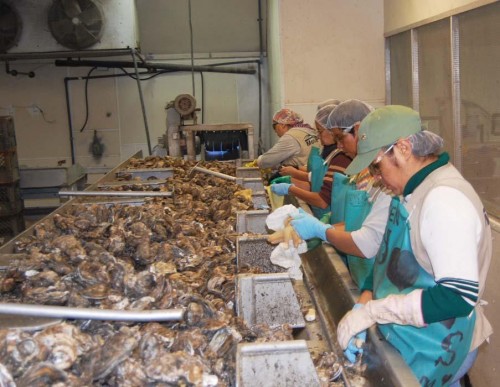
Lafourche courthouse back in business
November 3, 2009Nov. 5
November 5, 2009The proposed federal ban on untreated oysters harvested during the time of year when the weather is warmer is attracting opposition from public officials and oyster processors.
“A lot of people are complaining. It’s yet another hurdle,” said state Rep. Jerry Gisclair of Larose, who represents coastal Lafourche Parish.
The ban by the Food and Drug Administration, which would begin in 2011, is on oysters that have not been processed to remove Vibrio vulnificus, the bacterium active in warm weather that can cause illness in people with weakened immunity or impaired health.
Around 15 percent of oysters in Louisiana are currently treated to remove the bacterium, according to Mike Voisin, the CEO of Motivatit Seafoods in Houma who sits on the board of the Louisiana Oyster Task Force.
Untreated oysters harvested in Louisiana, Texas and Florida could not be sold from May to September, said Robin Winchell, spokeswoman for U.S. Rep. Charlie Melancon (D-Napoleonville), who represents much of coastal Louisiana.
Because of hotter temperatures, Vibrio vulnificus is more prevalent in oysters living on the Gulf Coast than on the Atlantic and Pacific coasts.
According to the Food and Drug Administration, since the mid-1990s technology has existed that can remove the bacterium from oysters, including high pressure processing, individual quick freezing, low dose irradiation and mild heat.
But Gisclair said implementing the technology is an expense the seafood industry does not want.
“It’s an unnecessary cost into their operation. It will hurt the market,” Gisclair said. “Not everybody is geared up for the process.
“Chefs are saying it destroys the special taste of oysters,” he said. “I haven’t tasted processed oysters, but they say it’s not the same.”
Last week, Melancon sent a letter to Donald Kraemer, the FDA’s deputy director of food safety, stating that the ban on unprocessed oysters would cause a loss of jobs in the state and harm Louisiana’s seafood culture.
“He feels there can be a lot more moderate approach,” Winchell said.
Melancon requested earmarks that were placed into appropriations bills for 2009 and 2010 funding an oyster industry education campaign on the danger of at-risk consumers eating raw oysters. Both earmarks were for $174,000.
“He’s taken an educational approach,” Winchell said.
Motivatit Seafoods has been treating oysters with high pressure processing for 10 years. The company also sells oysters that are not processed and ones subjected to the individual quick freeze method, Voisin said. The company is working on implementing an irradiation process as well.
“Processed oysters have a niche in the marketplace,” he said. “That flavoring process can be different. It is a raw-like experience.”
Voisin emphasized that he favors consumers being able to elect to eat treated oysters or the raw kind, comparing it to the choice between eating food items sweetened with artificial sweeteners or sugar.
“We’re all adults. We should understand our health system,” he said. “We need to educate consumers. Post-harvest processing has advantages. IQF (individual quick freezing) has a longer shelf life. But it shouldn’t be a requirement. Persons with an illness should eat cooked or post-harvest processed seafood.”
Gisclair said, “I know safety is of primary importance.”
The incidents of people being harmed by eating unprocessed oysters are isolated, according to Gisclair, who said he favors the use of refrigeration on fishing vessels.
“It’s the individual, not the oyster,” he said. “A small percentage, maybe one or two, of processors use post-harvest processing in Houma. At the state level we will take whatever action we can between now and the session, but this is coming from the federal government.”
In an Oct. 17 speech to the Interstate Shellfish Sanitation Conference, Michael Taylor, the senior adviser to the commissioner of the FDA, said the goal set by the conference to reduce cases of Vibrio vulnificus by 60 percent in Louisiana, Florida, Texas and California had not been met.
In 2003, California prohibited unprocessed Gulf Coast oysters from entering the state. The reduction goal has not been reached despite the virtual elimination of vibrio cases in California because of the state’s ban.
“We no longer believe,” Taylor said, “that measures which reduce the hazard, but fall well short of eliminating it, such as improvements in refrigeration, are sufficient to meet the purpose of the regulation, given the severity of the hazard and the availability of post-harvest processing technologies.”
Oyster shuckers at Motivatit Seafood get to work at the Houma oyster plant. A proposed federal ban on untreated oysters has many people complaining that it would cause a loss of jobs in the state and harm Louisiana’s seafood culture. * Photo by KYLE CARRIER










